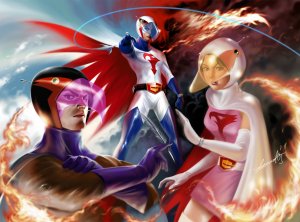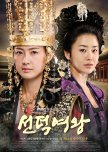I’ve seen many impressive child actors, but I don’t think I’ve ever been as impressed as I was with Nam Ji-hyun, who was 14 when she played Deokman in Queen Seonduk (2009). The vigor and vitality she brought to the role utterly won me over as they translated well to what the role demanded: a tomboyish toughness that allows a girl to convincingly cross-dress and act like a boy. In fact, Nam Ji-hyun was so effective that I worried on behalf of Lee Yo-won who plays the older version of the male-impersonating Deokman and whose pretty face and figure work against the character’s conceit. I needn’t have worried: Lee Yo-won more than made up for the discrepancy with a lively, spunky, and outgoing performance prior to her character becoming Queen (and a restrained albeit powerful performance subsequent to her character becoming Queen).
Then there was Ko Hyun-jung who plays Mishil.
I don’t think a K-Drama villain has had a better screen presence than Ko Hyun-jung’s Mishil. It was a combination of the music, the costume, and the close-up shots of Ko Hyun-jung’s Cheshire Grin, featuring a raised right eyebrow and dilated unblinking eyes, not to mention the character’s habit of referring to herself in the third person, that made Mishil THE character you loved to hate. It was the finest example of doing a lot by doing very little, a stroke of directorial genius.
Having said that, the drama had a glaring weakness; namely, the fictional liberties taken with Bidam only to try to have it both ways and make Bidam resemble his historical version. Though the same strategy is successfully applied to Deokman/Queen Seonduk, I never quite bought the love that supposedly existed between Bidam and Queen Seonduk, which was key in affirming Bidam’s historical credentials within the drama’s context. If Queen Seonduk loved anyone, that was Yushin. Friendship, sympathy, and compassion were more plausible when speaking of the feelings that existed between Bidam and Queen Seonduk.
Having said that, Queen Seonduk has a lot more going for it than against. The episodes dealing with Mishil’s palace coup, Princess Deokman’s staging of a solar eclipse, and Deokman’s formative years in the desert, are some of the most colorful, cinematic, and compelling K-Drama I’ve ever seen. They themselves are worth investing the 62 hours of one’s life that Queen Seonduk demands of the viewer.
Was this review helpful to you?

















